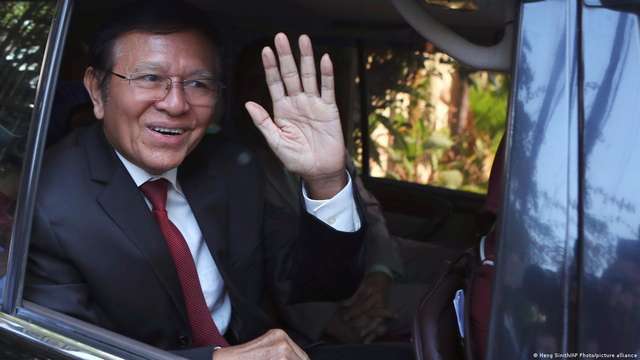
Kem Sokha, the Cambodian opposition leader, has been sentenced to 27 years of house arrest after he was found guilty of treason. The 69-year-old was arrested in 2017 without a warrant and had since been in detention.
Sokha’s trial began three years ago and was delayed by COVID-19 and the government’s search for evidence against the opposition leader.
Apart from the lengthy sentence, Sokha was also banned from contesting and voting in any election. He would no longer be allowed to see others except members of his family. The judge at the Phnom Penh Municipal Court said Mr Sokha was guilty of conspiracy with a foreign power, a crime under article 443 of the Cambodian criminal code.
Cracking down oppositions in Cambodia
There is no formidable opposition party in Cambodia. Prime minister Hun Sen is often accused of cracking down on opposition parties that performed strongly during elections or those he feels would pose a threat to him in future elections.
Kem Sokha was arrested after his party, the CNRP, did extremely well in a 2017 local election. To many, it was an indication that the party would pose a serious challenge to the ruling CPP in 2018’s general elections. Hence, Kem Sokha was detained and his political career now technically crippled.
Following his arrest, the CNRP was dissolved and linked to criminality. With Kem Sokha in detention and his party dissolved, there was no formidable opposition at the time of the 2018 polls, hence the Cambodian People’s Party (CPP) won overwhelmingly in the elections that year.
“The United States is deeply troubled by the conviction of respected Cambodian political leader Kem Sokha,” the US embassy to Cambodia said in a statement released on Friday. “The multi-year process to silence Kem Sokha, based on a fabricated conspiracy, is a miscarriage of justice.”
“Denying Kem Sokha and other political figures their freedom of expression and association undermines Cambodia’s constitution, international commitments, and past progress to develop as a pluralist and inclusive society,” the statement added.
With the Cambodian election coming up later this year, Hun Sen has resumed his crackdown on every sort of opposition. Last month, he revoked the licence of Voice of Democracy, an independent media outlet in the country.
The independence of Cambodia’s judiciary is in doubt
Although the judiciary is supposed to be an independent arm of government, the Cambodian courts seem to be under the control of Hun Sen. Opposition leaders in the country and other observers believe the courts are tools used by the country’s head of government to shut the mouths of opposition parties in Cambodia.
Following Friday’s judgement, Phil Robertson, the Asian deputy director at Human Rights Watch, said the decision showed the judiciary’ “total lack of independence.”
“Governments that have sought for decades to promote a rights-respecting Cambodia should use this nonsensical and punitive verdict to reassess their approach to Hun Sen’s government,” Mr Robertson said.
Like Mr Robertson, the Deputy Regional Director of Amnesty International in Asia, Ming Yu Hah expressed a similar opinion, condemning the Prime Minister’s unlimited use of the courts.
“This verdict is an unmistakable warning to opposition groups months before national elections,” Ming Yu Hah said in a statement. “The use of the courts to hound opponents of Prime Minister Hun Sen knows no limits.”
“Sokha is one of many opposition figures who has been put through a physically and psychologically taxing ordeal which will continue after today’s unjust verdict. There can be no right to a fair trial when the courts have been co-opted by the heavy hand of the government,” the statement added.
27 years sounds like a life sentence
At 69 years, Kem Sokha’s 27-year sentence could better be described as a life sentence. His prison time would be over when he is 96. Therefore, the judgement of the court could be a way of keeping him out of politics for the rest of his life. If he is blessed with a long life and gets out at the age of 96, there would be very little or nothing he could do then.













0 Comments